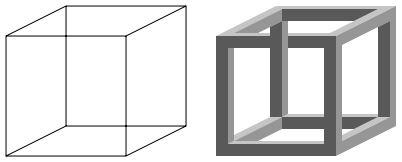Copernicus
Industrial Grade Linguist
I've posted this OP on another discussion board that I frequent, so apologies if you've seen it before.
Reality is an illusion that can only be defined only in terms of how our bodies interact with it. Since we interact in different ways, the mind constructs many different models of reality, and those models ultimately contradict each other in some ways.
To explain exactly how different models of reality contradict each other, I like to use the simplest example of an optical illusion: the Necker cube.

A necker cube is a 2D diagram that consists of two overlapping squares with their corners connected by parallel lines. The illusion is that of a 3D cube that faces either left or right, depending on which square one takes to be the front face of the cube. The above diagram also has an impossible cube, which demonstrates how powerful and contradictory the illusion can be.
The key concept in my argument about there not being a "single reality" is perspective. By taking different perspectives--which square is the front face in the case of the Necker cube--we can flip between different states of "knowledge" about what we are looking at. One might take the 2d image as a kind of underlying reality, but even that is an illusion from the perspective of a single pixel in the diagram. From its local perspective, there is no larger diagram, just its local neighborhood of pixels.
Does the sun rise in the east and set in the west? Does the sun move relative to the Earth, or does the Earth move relative to the sun? Consider the refrain of an old Beatles song:
The answer to those questions is that both are true and not mutually exclusive of each other. However, they do sort of contradict each other in that you have to shift perspective to answer one way or the other, just as you do with the two interpretations of the Necker cube.
So, is there just one underlying reality, no underlying reality, or many? It all depends on perspective.
Reality is an illusion that can only be defined only in terms of how our bodies interact with it. Since we interact in different ways, the mind constructs many different models of reality, and those models ultimately contradict each other in some ways.
To explain exactly how different models of reality contradict each other, I like to use the simplest example of an optical illusion: the Necker cube.

A necker cube is a 2D diagram that consists of two overlapping squares with their corners connected by parallel lines. The illusion is that of a 3D cube that faces either left or right, depending on which square one takes to be the front face of the cube. The above diagram also has an impossible cube, which demonstrates how powerful and contradictory the illusion can be.
The key concept in my argument about there not being a "single reality" is perspective. By taking different perspectives--which square is the front face in the case of the Necker cube--we can flip between different states of "knowledge" about what we are looking at. One might take the 2d image as a kind of underlying reality, but even that is an illusion from the perspective of a single pixel in the diagram. From its local perspective, there is no larger diagram, just its local neighborhood of pixels.
Does the sun rise in the east and set in the west? Does the sun move relative to the Earth, or does the Earth move relative to the sun? Consider the refrain of an old Beatles song:
But the fool on the hill
Sees the sun going down
And the eyes in his head
See the world spinning round
The answer to those questions is that both are true and not mutually exclusive of each other. However, they do sort of contradict each other in that you have to shift perspective to answer one way or the other, just as you do with the two interpretations of the Necker cube.
So, is there just one underlying reality, no underlying reality, or many? It all depends on perspective.
